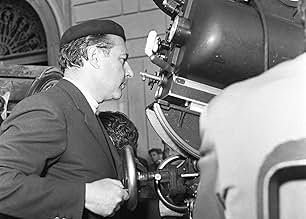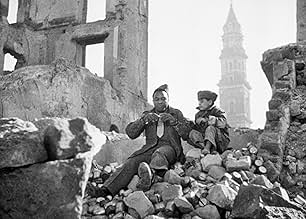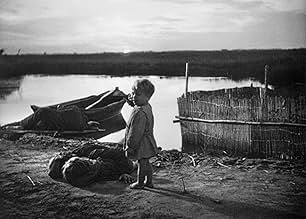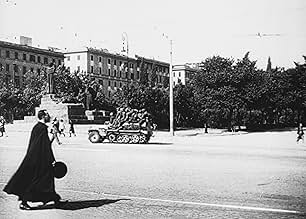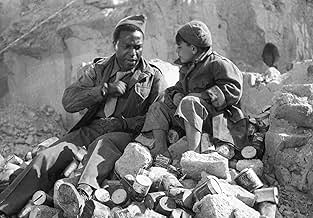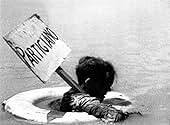A barreira linguística tem consequências trágicas em uma série de histórias não relacionadas durante a Campanha Italiana da Segunda Guerra Mundial.A barreira linguística tem consequências trágicas em uma série de histórias não relacionadas durante a Campanha Italiana da Segunda Guerra Mundial.A barreira linguística tem consequências trágicas em uma série de histórias não relacionadas durante a Campanha Italiana da Segunda Guerra Mundial.
- Indicado a 1 Oscar
- 10 vitórias e 2 indicações no total
- American Soldier (episode I: Sicilia)
- (as Leonard Penish)
- Joe - American MP (episode II: Napoli)
- (as Dots. M. Johnson)
- Pasquale (episode II: Napoli)
- (as Alfonsino)
- Harriet - Nurse (episode IV: Firenze)
- (as Harriet White)
Enredo
Você sabia?
- CuriosidadesThe monks in the fifth episode were authentic Franciscan monks from the Maiori convent, near Salerno.
- Erros de gravaçãoAt approximately 1:36 (2:05 version), during Episode V, as the American Army Catholic Chaplain stands in the center of the screen discussing his two associate Army Chaplains (Protestant and Jewish) with the monks, you can see two individuals standing in the doorway behind them (they appear to be the other two Army Chaplains). In less than a minute, they suddenly disappear.
- Citações
Captain Bill Martin - the catholic chaplain (episode V: Appennino Emiliano): I've never examined their consciences. I've never discussed this with them. I've never asked them anything, because I never felt I could judge them. I know them too well. They're good friends. Perhaps you, here mind this peace, this atmosphere of serene meditation, consider me guilty. I don't feel guilty. My conscience is clear.
- Versões alternativasOriginally premiered at the Venice Film Festival on September 8, 1946 in a longer cut (running 134 minutes). Later cut to 125 minutes. The 134 min. cut has been restored from material found at the Bundesarchiv-Filmarchiv in Berlin, Germany and has premiered at the 55th Venice Film Festival in 1998.
- ConexõesEdited into Il sasso in bocca (1970)
From vignette to vignette, the allied forces move their way upward from Sicily to northern Italy. Among them, I got struck by how frank the issues were being dealt with, and how levels of humanity and kindness crept their way in. For example, the story with the drunken black man who spends some time with a kid dealing in the black-market, this is an emotionally complex scene- a viewer won't know how it'll turn out in the first few minutes, but it unfolds precisely to the characters' natures. The story involving the soldiers spending time in the monastery was also powerfully simplistic in the way it dealt with the themes of faith and sacrifice (the later stems to the other vignettes). And there are numerous other moments and scenes that can stop you dead in your tracks- a young child that cries in one scene and a nurse braving enemy territory had my mouth open.
I realize not that many people in my generation will seek out this film- notably since it's not easy to find except on-line- and certain scenes may seem too 'mushy' for some. However, there is worth to seeking out a work such as Paisa- in a sense, this and Rossellini's other early films were like the first independent films to Italy's claim. There isn't any sign in any of his post-war pictures that he's catering to studios or working on big budgets. These are stories being told with little money, non-professionals, and they definitely last years later after all the rubble was cleared. Maybe most remarkable is the way Rossellini and his writers (one of them Fellini) let things happen, and not without consequence or without logic of some sort.
It's also a technically brilliant feature, with the cinematography by Otello Martelli creating shots as heart-rending as the performances. So, for those who hate dictated plots, sloppy clichés, and all the other disappointments found in 21st century movie-making & storytelling, this is a great place to dip your toes. If anything, it's surely thrilling as a war film.
- Quinoa1984
- 26 de jan. de 2004
- Link permanente
Principais escolhas
- How long is Paisan?Fornecido pela Alexa
Detalhes
- Data de lançamento
- País de origem
- Idiomas
- Também conhecido como
- Paisan
- Locações de filme
- Uffizi Gallery, Florença, Toscana, Itália(episode IV: Firenze)
- Empresas de produção
- Consulte mais créditos da empresa na IMDbPro
- Tempo de duração2 horas 6 minutos
- Cor
- Mixagem de som
- Proporção
- 1.37 : 1
Contribua para esta página


